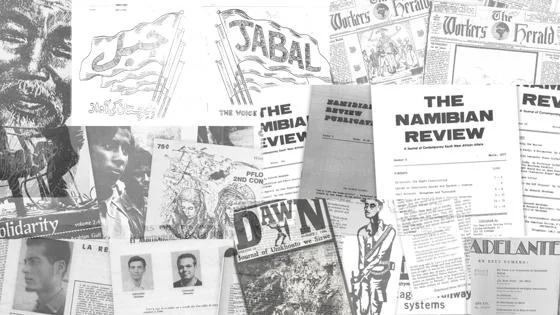Uncovering the complexities of anti-colonial Indian thought

Contents
International Relations (IR) is the study of global power – an attempt to understand why sovereign states interact the way they do, and how nations are impacted by, and will in turn impact, others. While it has been argued that IR is too Eurocentric – positioning Europe and Western thought at the centre of the world - focus has widened to consider non-European thinkers and their approaches to the world. In many cases, however, these scholars are viewed through an anti-colonial lens – as thinkers concerned with issues of emancipation, equality and justice as opposed to the more hierarchical view of world power taken by those with pro-imperialist views. But is this too blunt a reading of views of the time? How can we understand the works of those from colonised nations whose views were less rigidly anti-colonialist than is often presented?
Dr Martin Bayly, a specialist in historical international relations at LSE, set out to address this question. His paper, published in the Review of International Studies, explores how Indian thinkers of the early 20th century approached issues of world order. This was a time of political upheaval for India, with the Indian independence movement gaining momentum before achieving independence from Britain in 1947. Scholars, activists and thinkers at this time took a range of positions on what India’s role should be in the world order - many advocated against British imperial rule yet some also explored the idea of a "greater India", a concept that, some suggested, could include India’s colonisation of parts of Africa.
Points would crop up that I wasn’t expecting, like the discussion over whether East Africa should become a colony for Indians.
"There is a vast archive of Indian writers, activists, scholars, poets – all sorts of figures and revolutionaries – reflecting their perspective on the state of the world in the first half of the 20th century," he explains. "On reading through these archival materials, I was seeing a lot of what we would expect on the need to escape from empire and on the racism, economic exploitation and legal subjugation of empire and the projects that were put in place to try and escape that.
"But alongside these arguments, points would crop up that I wasn’t expecting, like the discussion over whether East Africa should become a colony for Indians who were there as overseas workers, merchant capitalists and so on. Attached to that was the idea of whether Indian pioneers as they were known – those living overseas in East Africa – could act as a ‘civilising’ presence on African communities."
India as a civilising and world power
This desire for India to have a stronger global presence, and discussion about the way Indians in East Africa could benefit the native communities they were living amongst took Dr Bayly by surprise.
"It’s a way of talking about the world that we would normally expect from an imperial state, not from a country or people that were already colonised," he continues. "The writings of Indian sociologist Benoy Kumar Sarkar, for example, stray between a vision of Indian emancipation but also the portrayal of India as a civilising power that has influenced the wider region. This is quite a hierarchical idea that you wouldn’t expect from an anti-colonial thinker, and I found that intriguing."
It’s natural that their ideas would reflect these different approaches that are a mix of anti-colonialism, internationalism and imperialism.
To explore further this contradiction between the calls for Indian emancipation from empire alongside the argument to flex its own power in the wider world, Dr Bayly studied the writings on members of the "Greater India" Society, a network which included some of the key Indian thinkers of the time – many of whom would normally be categorised as anti-colonial.
"The Society was trying to recover India’s cultural and historical vitality in the region, but it was also sketching out an imagined geography of greater India," he says. "This was even described as cultural imperialism, and we see in journals and writings of the time that they were trying to sketch out this historical spread of Indian civilisation and culture, language and influence. That again is the sort of thing we would expect more from imperial variants of international thought, and so my work is about trying to understand how it could be that we could have these ideas of anti-colonialism and emancipation alongside the more hierarchical ideas of empire."
Dr Bayly believes that the eclectic approach to issues of empire and global power found in some of these sources can be at least partly explained by the global intellectual and political circulations prominent Indian scholars were part of, with their movement through various transnational circuits leading them to pick up different traditions and influences along the way. "As a result, their thinking pulls on different traditions," he says. "It’s natural that their ideas would reflect these different approaches that are a mix of anti-colonialism, internationalism and imperialism."
Histories of international thought beyond Europe and North America
When asked how Indian thinkers and activists at the time were able to marry their anti-colonial views with the call for an expanded India, Dr Bayly cautions against taking too rigid a view over how we approach historical figures, highlighting the need to view their writings in context and as a product of their time.
"This goes to the heart of how we read international thought," he says. "Often, we separate historical writings analytically – as examples of internationalism, or imperial or anti-colonial thought for example – but that’s not necessarily how we should read these texts. We need to record the fact that these thinkers were located in their time and space and weren’t necessarily speaking to a tradition that we now see as having emerged at that time.
"My paper is partly about saying that the way that traditions of international thought come together are always in the process of becoming. Today,we read them as having always been different traditions, but actually at the time that wasn’t necessarily the case."
Gaining a more nuanced understanding of the attitudes of the time is important as these feed into some of the movements being seen today internationally, Dr Bayly contends. "When questions of caste in South Asia are brought up, for example, we can see this social hierarchy that sometimes informs wider visions of how to order society, including internationally," he explains. "We’re also seeing this with the rise of the Hindu nationalist right in India, which has seen a return to the ways of describing the world that attempt to put India in a more superior position. These issues bring to the fore the need to understand where these ideas came from historically, which is what I’m trying to do with the paper."
However, while early 20th century Indian political discourse around issues of global power were more complex than has been previously considered, they are still distinct from European concepts of imperialism of the time, Dr Bayly stresses. "I’m not making the argument that these scholars were imperialist in the way that European imperialism functioned," he concludes, "but their writings do take a less egalitarian approach than one might expect, which does suggest that hierarchy as a way of ordering the world as a form of power doesn’t only belong to European empires and certain forms of imperial international thought.
"These hierarchies come from many different sources, and that is partly what my project is about – it’s speaking to the calls within International Relations to do a much better job of engaging with histories, and particularly histories of international thought from beyond Europe and North America."
Dr Martin Bayly was speaking to Jess Winterstein, Deputy Head of Media Relations at LSE.
Download a PDF version of this article




